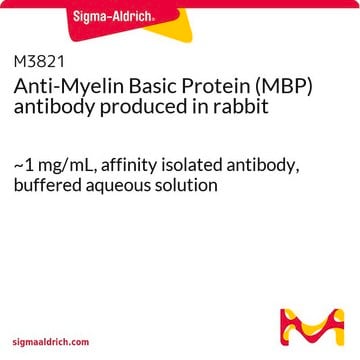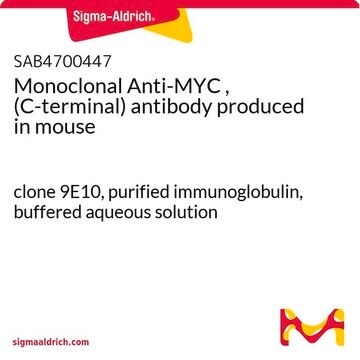06-340
Anti-Myc Antibody
Upstate®, from rabbit
Synonyme(s) :
Transcription factor p64, avian myelocytomatosis viral oncogene homolog, myc proto-oncogene protein, v-myc avian myelocytomatosis viral oncogene homolog, v-myc myelocytomatosis viral oncogene homolog (avian)
About This Item
Produits recommandés
Source biologique
rabbit
Niveau de qualité
Forme d'anticorps
affinity isolated antibody
Type de produit anticorps
primary antibodies
Clone
polyclonal
Espèces réactives
human, mouse, Xenopus, avian
Fabricant/nom de marque
Upstate®
Technique(s)
ChIP: suitable
immunocytochemistry: suitable
immunoprecipitation (IP): suitable
western blot: suitable
Isotype
IgG
Numéro d'accès NCBI
Numéro d'accès UniProt
Conditions d'expédition
dry ice
Informations sur le gène
human ... MYC(4609)
Description générale
Spécificité
Immunogène
Application
4 µg of a previous antibody immuno-precipitated Myc as shown by an independent laboratory.
Immunocytochemistry:
This antibody has been used for immunocytochemistry by an independent laboratory. (Ohtsuka, T., 1998)
Epigenetics & Nuclear Function
Transcription Factors
Qualité
Western Blot Analysis:
0.5-2 µg/mL of this lot detected Myc in A431 lysates from EGF-stimulated human A431 cells. 0.5-2 µg/mL of a previous lot detected Myc in RIPA lysates from human A431 cells and HeLa nuclear extract.
Description de la cible
Forme physique
Stockage et stabilité
Handling Recommendations:
Upon first thaw, and prior to removing the cap, centrifuge the vial and gently mix the solution. Aliquot into microcentrifuge tubes and store at -20°C. Avoid repeated freeze/thaw cycles, which may damage IgG and affect product performance.
Remarque sur l'analyse
Positive Antigen Control: Catalog #12-302, EGF-stimulated A431 cell lysate. Add 2.5µL of 2-mercaptoethanol/100µL of lysate and boil for 5 minutes to reduce the preparation. Load 20µg of reduced lysate per lane for minigels.
Autres remarques
Informations légales
Clause de non-responsabilité
Not finding the right product?
Try our Outil de sélection de produits.
Code de la classe de stockage
12 - Non Combustible Liquids
Classe de danger pour l'eau (WGK)
WGK 2
Point d'éclair (°F)
Not applicable
Point d'éclair (°C)
Not applicable
Certificats d'analyse (COA)
Recherchez un Certificats d'analyse (COA) en saisissant le numéro de lot du produit. Les numéros de lot figurent sur l'étiquette du produit après les mots "Lot" ou "Batch".
Déjà en possession de ce produit ?
Retrouvez la documentation relative aux produits que vous avez récemment achetés dans la Bibliothèque de documents.
Les clients ont également consulté
Notre équipe de scientifiques dispose d'une expérience dans tous les secteurs de la recherche, notamment en sciences de la vie, science des matériaux, synthèse chimique, chromatographie, analyse et dans de nombreux autres domaines..
Contacter notre Service technique














